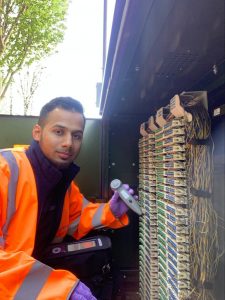CWU – protecting our Openreach engineers
Telecoms & Financial Services, BT, Telecom Engineers April 24 2020
“Lock yourself in your van and call the police,” is the message from CWU Capital Branch assistant branch secretary Pagget Lewis to any engineers threatened by people falsely linking 5G to the coronavirus.

Pagget Lewis
Pagget, whose branch area serves London’s central and west end areas, says some of his engineering members are “fearing for their lives,” as a result of this extremely worrying development and adds that he has received “loads of calls and emails” on this issue.
To engineering members, his message is clear: “Your health and safety is the priority, if attacked or threatened, then get back in your van if you can, lock the door and call the police.
“And also make sure you report the incident to your manager and also to the union,” he adds, making the point that “the national union has been strongly supportive of our members and we need to keep them informed from the frontline.”
Both the CWU and BT/Openreach are in regular contact with police forces with regard to any incidents and pressure is mounting for a more robust response from law enforcement.
And at branch and local level, this is also being demanded, says Pagget, insisting: “We need a much more active police response and we need to see arrests being made.”
Ishak Ali, the young workers officer for Capital Branch, says that colleagues are “feeling stressed and worried” about this situation.
“I see it on our work WhattsApp group, quite a few comments and instances mentioned and it’s all totally wrong when what we’re doing is working hard to keep the country fully connected at this crisis time,” he says.
“It hasn’t happened to me personally, but I’m constantly worried that it might – but if it does I’ll follow the union’s clear advice, I’ll get back in my van, lock myself in and call the police, then I’ll report it to Pag as well.”
Apart from this frightening development, work has continued among the branch’s engineering team, but with some appropriate changes to procedures and protocols, which the CWU has established with the company.

Ishak Ali
“We’re minimising as much as possible entering customer premises – not entering at all for installation work, and only entering for vital repair work under specific conditions and if it’s safe to do so.”
One of the most important of these conditions is that the customer is asked to go into another room of the premises and keep the door closed, although if the repair can be completed without entering at all, then this is preferable.
“For example, I’ve done two repair jobs today and I’m on my way to another one and I haven’t entered a customer premises today as I’ve managed to fix the problems at the cabinet,” Ishak explains.
“And sometimes, even if the location of the fault is inside the premises at the socket, sometimes we’re able to talk the customer through this over the phone, with the assistance of video and images.”
Customers have been “very understanding and supportive” of the need for these practices in the current crisis circumstances, Ishak points out.
And Pagget adds that, in spite of the awful reports of threats from a small minority, the vast majority of members of the public have been supportive of our telecoms engineers, and tells of engineers being applauded in the streets by grateful Londoners.
“Our members out on the frontline are doing a superb job and they fully deserve this appreciation – we the union, at all levels, will keep them safe and give them every support they need,” he vows.

